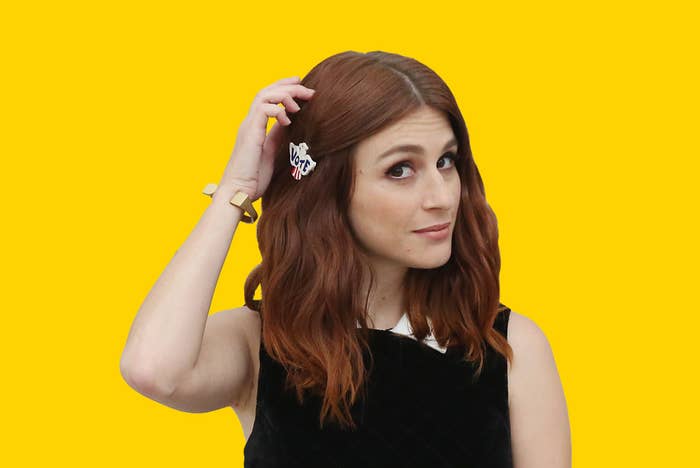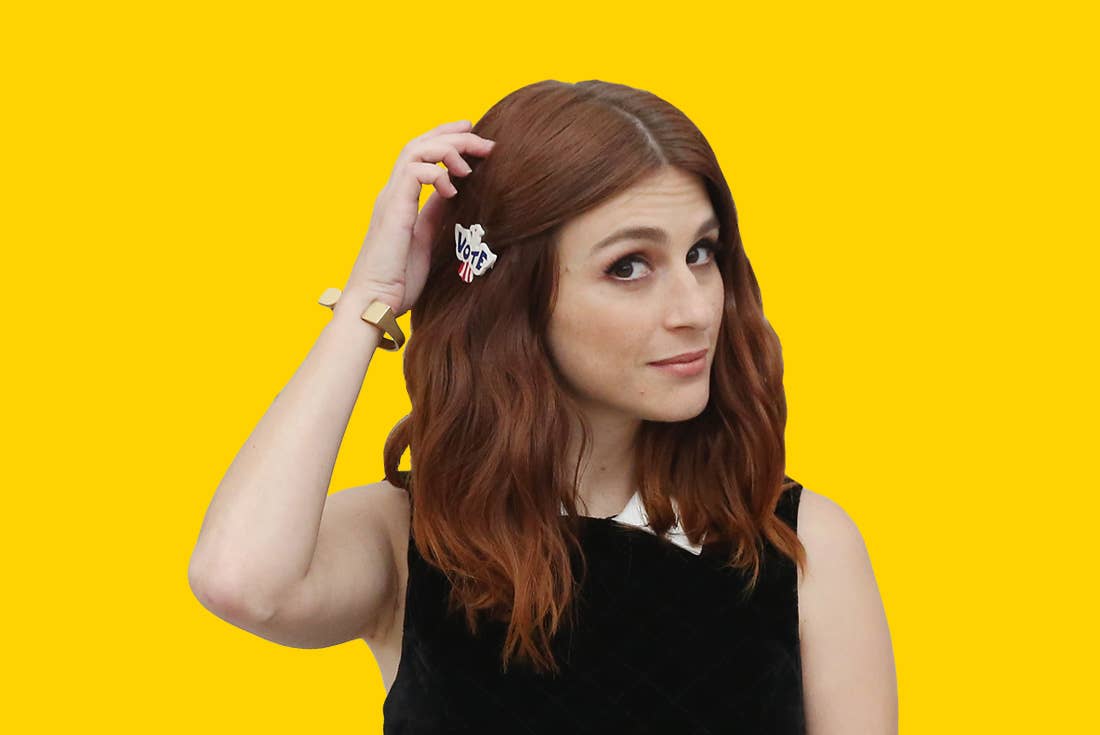
Unless you were holed up in the bunker you built to survive the Trump-led apocalypse, over the weekend you surely saw one of the biggest protests in American history. One day after the racist, sexist, homophobic, ethnocentric, Voldemort-esque Donald Trump was inaugurated as president, millions of people all over the country took to the streets to protest his new administration and all the horrifying values they uphold.
In an almost unprecedented act, scores of celebrities attended the marches, linking arms with everyday citizens driven by a common goal. Chelsea Handler organized a march at the Sundance Film Festival; others protested in New York City and Los Angeles, while a ton of celebs made the trek to DC to attend the main march. In these dark times, these famous women are using their platforms to speak truth to power, and are being heard by millions. It’s an act of immense value, even if our president—a former reality show host himself—thinks celebrities should butt out.
One of the most outspoken female celebrities so far has been Aya Cash, the star of You’re the Worst. Since even before November’s election, Cash was protesting:
This past Saturday, she attended the march in D.C. Afterwards, she talked to us about how surprisingly inspiring her experience was there, discovering and acknowledging her own white privilege, and her plan of action to make her voice heard during the next four years.
You haven’t been afraid to hide your anger at what’s going on in our country. Is that rage the main reason why you decided to march?
Part of it. My first election was in 2000. I was 18 and in Minnesota and I voted for Nader. I remember watching the results come in and screaming at the television about the idiots who voted for Bush, and half the room turned towards me and they were Bush supporters. I grew up in a very liberal bubble in San Francisco, and I really learned a big lesson in that moment. One, that I lived in a bubble, and two, [about] my arrogance in that moment and my assumptions about who [voted Republican]. Since then I’ve spent a lot of time thinking about how to interact with people who disagree with me and am constantly trying to check myself in terms of how I relate to that. Since the election, I've really struggled with feeling like that [effort] was a failure—maybe talking in this way is not helpful. It's a really hard thing to deal with because I don't agree with that on an intellectual level and yet I am so filled with hurt and rage and anger that I don't how to communicate anymore. And that's really scary. I think that that's part of my impulse: fueled by rage, but also fueled by confusion about how to handle this new time. And I think part of it was: you've got to do something. The effort that people made to get on planes and put their bodies in that space and say, “What we have heard is not okay”—I think was really important.
What was your experience like at the DC Women’s March?
Being there was even more inspiring than I would have thought. It was so positive—seeing how many families and kids were out and watching teenagers find their voices for the first time. And just seeing all these generations of women from all different walks of life and all different races. I've been filled with rage for a long time. It felt really lovely to be in a place where everyone was happy and excited to be there and share their voice.
How are you trying to use that energy going forward? What kind of actions do you personally want to take against this administration?
This election and this march has put a mirror up to myself as an educated, liberal white woman. I have never felt unsafe in my country and now I do. That is a new feeling [for me], but it’s not new for many people.
It starts with a white, liberal, informed person [like me] saying, “I have bias.” My responsibility going forward is to get more informed, and keep checking myself. I need to work on myself, and not just give money. It's about being active in terms of calling your representatives, connecting to groups that you think are doing good work and supporting them financially and through volunteer work. It feels so overwhelming, but you have to try or else, what's the point?
How have you started to acknowledge your own biases?
I also recently started a book called Blindspot: Hidden Biases of Good People. My friend Kelly and I were talking and I said, “Look. I have bias. I have issues that come up.” Subconsciously, my reactions are not always the right reactions and I know they're wrong—so what do I do when I have reactions to a young black kid coming on the subway alone at night? It's not reasonable to have a negative reaction to some kid, but that's a part of our culture and that's real. I think it's really hard to talk about this stuff. No wants to say, “I'm a racist.” Or, “I judge people.” No one wants to say that about themselves and yet, it's true. We have so many different kinds of biases and as soon as we start to acknowledge that in ourselves, the better off we're going to be.
You're on a TV show. People know who you are. Somehow though, Trump and his administration have tried to paint that as a negative thing, as if your platform negates your right to speak up.
His anti-celebrity stance is hilarious because he is one—that's how he got elected.
Now he's "a man of the people."
I would like to use whatever influence I have to simply point in other directions because the truth is, again, I am a heterosexual white female. Even though I feel endangered for the first time in my life and my reproductive rights are at stake, I am not in a vulnerable community. If there's anyone looking to me, the best option would be to point in another direction, to a community that may not be seen. It's important to be talking to these communities that are truly in danger under this new government.
What have you been doing to take care of yourself since the election?
I was out with my costar Kether [Donohue] the other night. We went and saw a Broadway show and in the street a guy came up to us and said, “Hey, I recognize you.” And of course we thought, “Oh, he watches the show.” And he said, “Yeah, you were on the subway crying the day after the election.” [Laughs.] So, lots of crying, lots of talking.
So, I just I have one last question.
If you say, “What's your Sunday Funday?” I'll shoot you. [Laughs.]
That doesn't really seem appropriate right now? Unless your Sunday Funday includes protesting?
That's a great answer!
That should be your new answer from here on out.
Great. Thank you for that.
No problem! So what other issues do you want people to rally around and approach with the same fervor that fueled the women’s march?
Our environment is an irreversible problem, so I think getting more informed about the environment is incredibly important. Our health care—I'm not sure what's going to happen with health care because I think, and maybe I'm being optimistic, that the administration is starting to realize the mass chaos and anger that will happen if ACA is completely gone. Roe v. Wade is a human rights issue. People are not going to stop getting abortions, they're just going to start having unsafe abortions. I could go on and on. Everyone needs to sign up for whatever Muslim registry there is, and I will commit to signing up for a Muslim registry despite the fact that I am not [Muslim], because that sets a scary precedent. I don't have a group of Muslim friends and I don't know a lot of people of that religion, so my job now is to go to a mosque and say, “Hey! Teach me.” I would hope that people just get outside of themselves and learn more about these cultures that we're told are terrible and bad and scary. That's going to help everyone.
Thanks so much for taking the time to talk with us.
Thank you for writing about this. That's all we can do, is keep talking about this shit for the next four years, hopefully not more. You have to be uncomfortable. All this shit is real.

